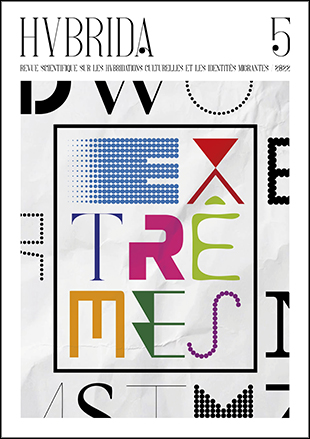Diasporic subject: between attempt at integration and temptation to fundamentalism, reading in ‘Ce vain Combat que tu livres au Monde’ of Fouad Laroui
DOI:
https://doi.org/10.7203/HYBRIDA.5(12/2022).24026Keywords:
subject, diaspora, integration, disintegration, fundamentalism Abstract
Abstract
This article proposes to explore through Fouad Laroui’s novel Ce vain combat que tu livre au Monde (Laroui, 2016) the different identity transformations of a diasporic subject in direct contact with immediate History. Its destiny is unfolding against the backdrop of an overmediatization of fierce and virulent debates, which draw the faces of a France inhabited by the specter of identity wars ((Blanchard et al., 2016), and faces a historical remanence which leaves profile how “identity ankyloses” (Shayegan, 1989, p. 5) that punctuate the present time are indebted to the “past that strives to emerge from the present” (Ashcroft et al., 2012, p. 50). Fouad Laroui seizes on the attacks that struck the heart of Paris in 2015 to open up analytical perspectives capable of informing us not only about certain conflicts that cross today’s multicultural society, but also about the means likely to reduce them. Thus, he invites us to read and reflect on the different interactions that a diasporic subject operates with the vagaries of a disrupted geopolitics and offers us a romantic explanation of a character whose life will capsize between the ardent desire to i integration into secular French society and the integrist temptation that unfolds in the theocratic society illustrated in its most monstrous face by the Islamic State.
 Downloads
Downloads
 References
References
Adraoui, M.-A. (2017). La hijra au service d’un projet de rupture intégral dans le salafisme français. Ethnologie française, 47, 649-658. https://doi.org/10.3917/ethn.174.0649
Appadurai, A. (2001). Après le colonialisme : Les conséquences culturelles de la globalisation (Traduit par Françoise Bouillot). Payot.
Ashcroft, B., Griffiths, G., Tiffin, H. (2012). L’Empire vous répond : Théorie et pratique des littératures post-coloniales. Presses Universitaires de Bordeaux.
Bancel, N., Bernault, F., Blanchard, P., Boubeker, A., Mbembe, A., & Vergès, F. (2010). Ruptures postcoloniales : Les nouveaux visages de la société française. La Découverte.
Blanchard, P., Bancel, N., & Thomas, D. (2016). Vers la guerre des identités? De la fracture coloniale à la révolution ultranationale. La Découverte.
Bastide, R. (1955) Le principe de coupure et le comportement afro-brésilien. In Anais do 31e Congresso Internacional de Americanistas, 1, 493-503. http://classiques.uqac.ca/contemporains/bastide_roger/principe_coupure_comportement_afro_bresilien/principe_coupure_texte.html
Foucault, M. (1966). La pensée du dehors. In D. Defert et F. Ewald (Dirs.) Dits et Écrits (tome 1, pp. 518-539). Gallimard.
Begag, A. (2003). L’intégration. Editions le Cavalier bleu.
Bhabha, H. K. (2007). Les lieux de la culture : une théorie postcoloniale (Traduit par Françoise Bouillot). Payot.
Bordes-Benayoun, C., & Schnapper, D. (2006). Diasporas et nations. Odile Jacob.
Hall, S. (2017). Identités et Cultures 1 : Politiques des Cultural Studies. Éditions Amsterdam.
Hollinger, D., & Duvoux, N. (2013). Focus – Vers une perspective postethnique. Informations sociales, (177), 106-107. https://doi.org/10.3917/inso.177.0106
Gafaïti, H. (2005). La diasporisation de la littérature post-coloniale. L’Harmattan.
Kalra, V-S., Kaur, R., & Hutnyk, J. (2005). Diaspora & Hybridity. Sage Publications.
Kamiejski, R., Guimond, S., De Oliveira, P., Er-rafiy, A. & Brauer, M. (2012). Le modèle républicain d’intégration : implications pour la psychologie des relations entre groupes. L’Année psychologique, 112, 49-83. https://doi.org/10.3917/anpsy.121.0049
Khatibi, A. (2008). Pensée-autre. In Œuvres de Abdélkébir Khatibi III Essais. La Différence.
Laroui, F. (2006). De l’islamisme : Une réfutation personnelle du totalitarisme religieux. Robert Laffont.
Laroui, F. (2015, décembre 10). Un récit qui n’oublie pas les perdants. Libération.fr. https://www.liberation.fr/debats/2015/12/10/un-recit-qui-n-oublie-pas-les-perdants_1419861
Laroui, F. (2016). Ce vain combat que tu livres au monde. Julliard.
Maalouf, A. (1998). Les identités meurtrières. Grasset.
Mekki, B. (1979). Les Arabes en France. Société Marocaine des Editions Réunis.
Moustir, H.(2019). De l’intermonde dans la fiction de Fouad Laroui. Expressions Maghrébines, 18(2). https://doi.org/10.1353/exp.2019.0017
Nouss, A. (2015). La condition de l’exilé : Penser les migrations contemporaines. Éditions de la Maison des Sciences de l’Homme.
Ogay, T. (2001). Comprendre les enjeux identitaires de l’intégration des migrants : l’apport de la psychologie sociale et interculturelle. In C. Perregaux, T. Ogay, Y. Leanza & P. R. Dasen (Eds.), Intégrations et migrations : regards pluridisciplinaires, (pp. 211-235). L’Harmattan.
Schnapper, D. (2007). Qu’est-ce que l’intégration ? Gallimard.
Shayegan, D. (1989). Le regard mutilé. Schizophrénie culturelle : pays traditionnels face à la modernité. Albin Michel.
Van der Poel, I. (2018). Ce vain combat que tu livres au monde : Fiction et violence. In N. Redouane, Y. Bénayoun-Szmidt, & B. Rey Mimoso-Ruiz (Dirs.), Fouad Laroui, (pp. 289-296). L’Harmattan.
Downloads
Published
How to Cite
-
Abstract690
-
PDF (Français )358
Issue
Section
License
![]()
All the documents in the OJS platform are open access and property of their respective authors.
Authors publishing in the journal agree to the following terms:
- Authors keep the rights and guarantee HYBRIDA the right to be the first publication of the document, licensed under a Creative Commons license Attribution-NonCommercial-ShareAlike 4.0 International (CC BY-NC-SA 4.0) that allows others to share the work with an acknowledgement of authorship and publication in the journal.
- Authors are allowed and encouraged to spread their work (once published) through electronic means using personal or institutional websites (institutional open archives, personal websites or professional and academic networks profiles) once the text has been published.
















